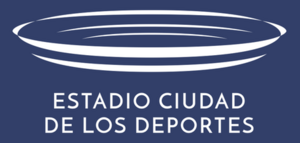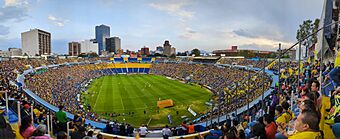Estadio Ciudad de los Deportes facts for kids
 |
|

Panoramic view of the interior of the Ciudad de los Deportes Stadium.
|
|
| Full name | Estadio Ciudad de los Deportes |
|---|---|
| Former names | Estadio Olímpico de la Ciudad de los Deportes (1947–1983) Estadio Azulgrana (1983–1996) Estadio Azul (1996–2018) |
| Location | Calle Indiana 255 Mexico City, Mexico C.P. 03810 |
| Coordinates | 19°23′0″N 99°10′42″W / 19.38333°N 99.17833°W |
| Owner | OCESA |
| Executive suites | 92 boxes |
| Capacity | 34,253 |
| Field size | 108 x 68 m |
| Construction | |
| Opened | 6 October 1946 |
| Renovated | 1996, 2004, 2010 |
| Tenants | |
| Club América (1947–1955, 2024–present) Atlante (1947–1955, 1983–1989, 1991–1996, 2000–2002, 2020–2024) Necaxa (1950–1955) Cruz Azul (1996–2018, 2024) Tazón México (2018–present) |
|
The Estadio Ciudad de los Deportes (which means Sports City Stadium in English) is a big stadium in Mexico City. It can hold 34,253 people! This stadium is used for exciting soccer games and also for American football. It has even hosted the Tazón México, a major American football event. Currently, it is the home stadium for the famous soccer team Club América.
This stadium has a cool secret: the playing field is actually built below street level, like a big pit! Right next to it, you'll find the Plaza México, which is the largest bullring in the world. In November 2024, the stadium was temporarily closed for safety checks. It reopened a few days later with new rules to make sure everyone stays safe.
Contents
Discover the Sports City Stadium!
The Estadio Ciudad de los Deportes is a well-known sports venue in Mexico City. It has been a home for many different soccer teams over the years. It's a place where fans gather to cheer on their favorite players and watch thrilling matches.
A Look at Its History
The stadium first opened its doors on October 6, 1946. It has had a few different names throughout its history, including Estadio Olímpico de la Ciudad de los Deportes and Estadio Azul. For a long time, from 1996 to 2018, it was the home of the Cruz Azul soccer team.
In 2016, there were plans to tear down the stadium. However, these plans were stopped in 2018, and the stadium continued to host events. In the 2023–24 soccer season, Cruz Azul even returned to play there again.
When Mexico hosted the FIFA World Cup in the past, this stadium did not host any games. This was mainly because of its age and some challenges with parking and traffic around the area.
Recent Changes and Team Moves
In November 2024, local officials temporarily closed the stadium. This was because it needed some important safety checks and repairs. This closure caused some changes for the teams that played there, like Club América, Atlante, and Cruz Azul.
The good news is that the stadium reopened on November 7, 2024! New rules were put in place to make it even safer. These rules included more security staff and encouraging fans to use public transport. Also, two big events are no longer allowed on the same day.
After these changes, some teams found new homes. Atlante announced they would move to the Estadio Agustín "Coruco" Díaz. Then, in January 2025, Cruz Azul shared that they would move to the Estadio Olímpico Universitario. Club América, however, continues to call the Estadio Ciudad de los Deportes its home.
Inside the Stadium: Cool Features
The Estadio Ciudad de los Deportes has been updated over time to make it a great place for fans and players. These updates help make sure everyone is comfortable and safe.
Here are some of the cool things you'll find inside:
- Two professional locker rooms for the soccer teams.
- Two locker rooms just for the referees.
- A special room for press conferences, where coaches and players talk to reporters. It can seat 50 people!
- A video system with seventy cameras that helps keep an eye on everything happening in the stadium.
- The stadium has 34,253 seats, and there are also 92 special boxes for a more private viewing experience.
Gallery
See also
 In Spanish: Estadio de la Ciudad de los Deportes para niños
In Spanish: Estadio de la Ciudad de los Deportes para niños
- List of football stadiums in Mexico





